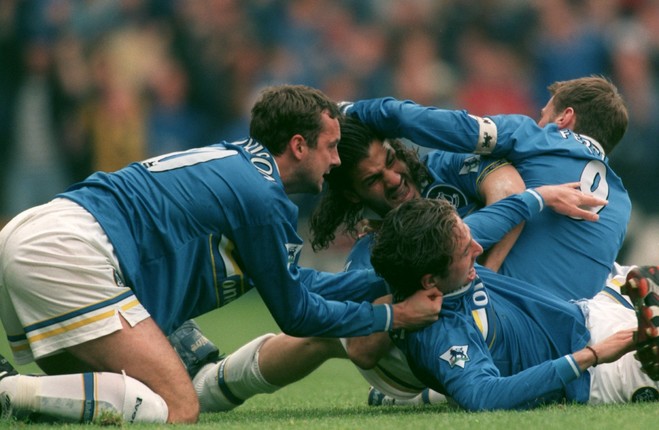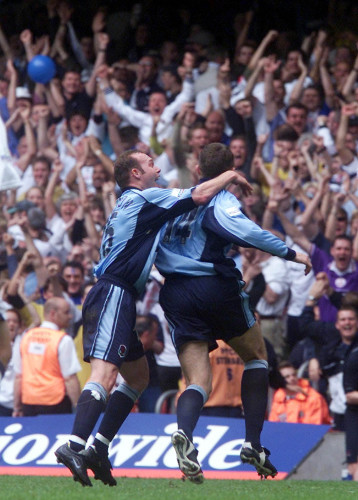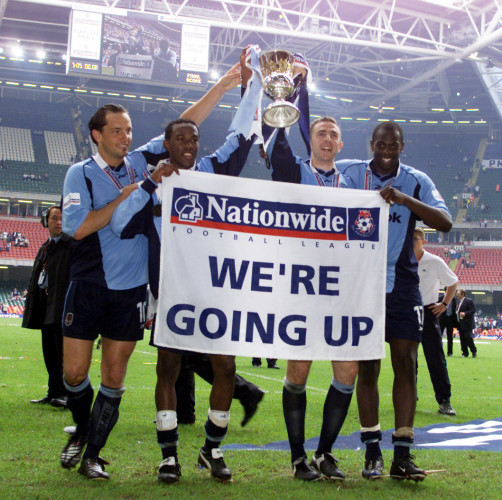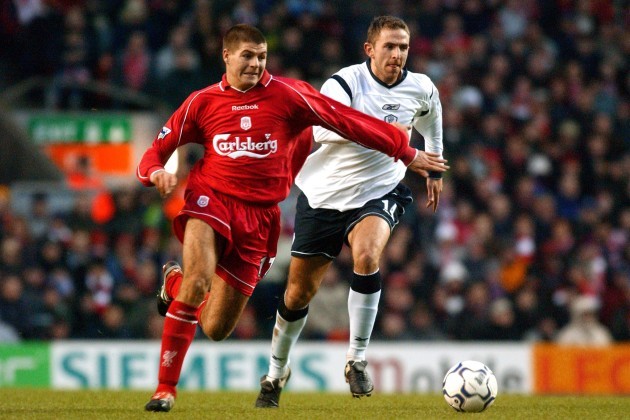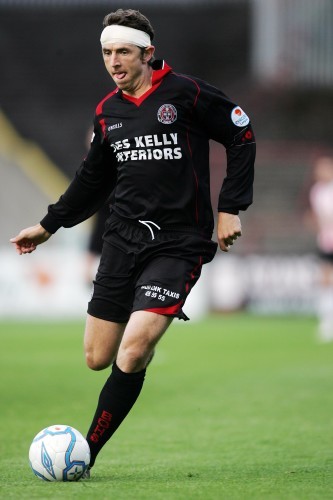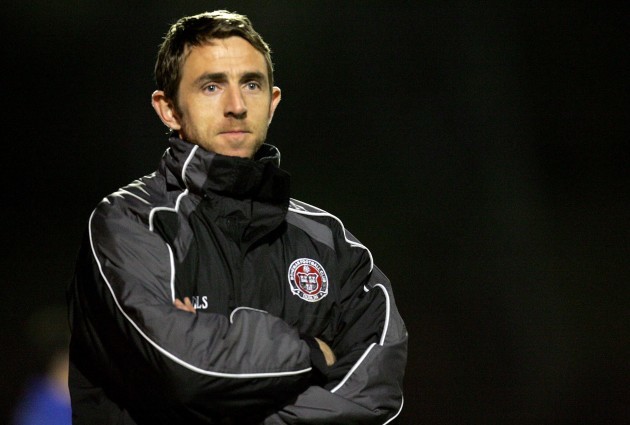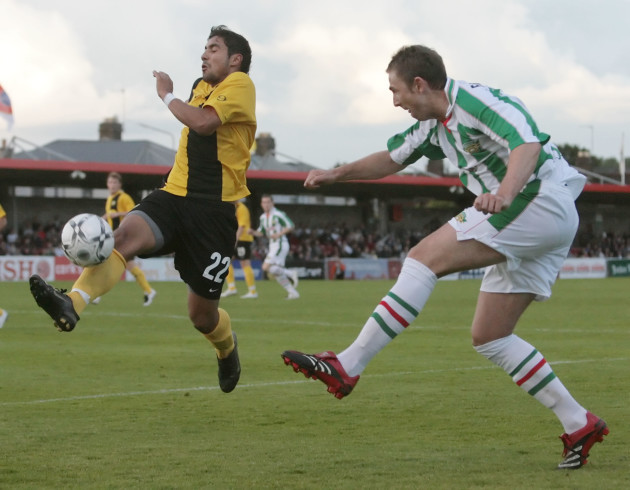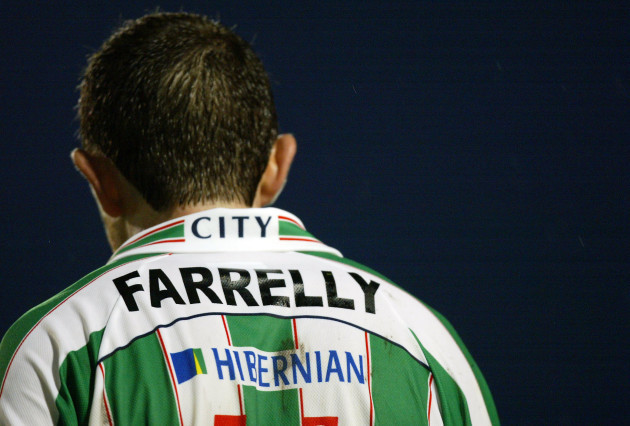ON THE PITCH, Gareth Farrelly knows how to play a pivotal role in a rescue act, and off it, his survival instincts were a significant part in saving his life.
In 1998, the former Ireland international was Everton’s hero as his stunning half-volley – the only league goal he scored for the club – helped the Toffees maintain their 44-year stay in England’s top flight.
Everton’s point in the 1-1 draw with Coventry City coupled with Bolton’s loss at Chelsea condemned the Trotters to relegation, with the Merseyside club staying up at the expense of Colin Todd’s side thanks to their superior goal difference.
But 10 years later, the Dubliner was fighting a very different battle.
While driving on a motorway in England, Farrelly felt unwell. He pulled in on the side of the road and started vomiting blood, but still managed to call an ambulance that rushed to his aid.
After several tests, it was revealed he would need major surgery after an aneurysm was discovered. Consequently, his entire spleen was removed, plus 40% of his pancreas, 20% of his stomach, and part of his colon.
“In April, it was nine years since it happened,” Farrelly tells The42. “It has been spoken about before, but it was an aneurysm of the splenic artery, and fortunately I’m part of the 10% that survive an aneurysm of this type. It was one of those freak things, there were no symptoms.
“I am extremely blessed because the people that looked after me at the hospital were amazing. I am still in contact with them and I am eternally grateful to them for their intervention.
“During the recovery period, I was in essence starting from scratch again – it was horrific for me and it was horrific for my family, but I’m very lucky.
It does change your whole outlook on life; you appreciate how lucky you are and how bad it could have been. It is not as if you wake up every morning, pull back the curtains, and scan all around you taking it all in, but it certainly gives a different perspective at certain times.
If recounting that day conjures up traumatic memories, Farrelly looks back fondly on his time with Everton, the club he supported as a boy, even if it didn’t end the way he would have hoped.
“I signed the contract before we had finished the negotiations because I knew I wanted to play for Everton.
“I was signed by some of my heroes growing up. Howard Kendall was the manager and Adrian Heath was his assistant,” Farrelly, who joined the club from Aston Villa, recalls.
“The season we avoided relegation was a difficult one for everybody. It was my first full season playing first-team football. I hadn’t given any thought to the fact that the club had struggled over the previous couple of seasons. I just knew I wanted to play for them.
“The pressure just built as that season went on. In a struggling team, it is very hard for people to stand out and you invariably find yourself struggling, people were lacking confidence. It’s hard to play well when everybody is under that sort of pressure.
“Especially as a footballer, it is difficult to impose yourself and affect a game if people are happier not having the ball and seeking to protect themselves, and their position.
“It can be difficult; there are different types of bravery. Some players kick somebody up in the air and the fans sing their name, whereas players know the difference and know who they can rely on in the group when the pressure is building.”
Despite his last-day heroics, the former Home Farm youth product didn’t get on with the new manager Walter Smith, who replaced the sacked Kendall at the end of the 1997-98 season.
“I played eight minutes of Premier League football after we stayed up. Of course, there was bitterness and frustration there.
“In the first year, Walter wanted to get rid of a certain group of players and that included me. As within any club, when a new manager comes in, the chairman made funds available. This wasn’t afforded to Howard, and Walter brought in his own signings. There were some really top, top players ostracised. Some did get back into the team but most moved on.
“We had come through something incredibly difficult and you think it’s going to get a lot better and easier now, but I probably reacted in the wrong way when the manager said that I could leave.
“In his second year in charge we [the out of favour group] were called back to pre-season on 14 June, while everybody else wasn’t brought back until 6 July. It was a means to get under people skins – trying to get them to move on.
I did incredibly well in the pre-season and there was a trip to Italy to come. The manager called me in and said he had been impressed with my attitude and how I was performing and that he wanted to bring me away, but I reacted the wrong way. I said I didn’t want to go to Italy for eight days to be a human mannequin, making up the numbers for his training sessions and that I’d rather leave.
“I look back on that, and I know I would have been better served dealing with it differently.”
To help reinvigorate his career, Farrelly accepted the chance to become Sam Allardyce’s first signing at Bolton Wanderers, ironically, the club that he had helped relegate from the Premier League. He would go on to spend five years with the club.
The former Villa trainee enjoyed a successful period under Allardyce, and scored the first goal in their play-off final victory over Preston that helped seal their return to the top division.
“The fans used to remind me of the goal that got them relegated all the time, but I did get a goal that helped us back up.
“We then managed to stay up when we had all these doubters predicting relegation, and the club then entered its most successful period.”
But just like his time at Everton, Farrelly left the club on a sour note after a falling out with Allardyce.
“I caused a lot of my own problems. There were changes at Bolton as time went on and the relationship deteriorated.
“You look back at football; you make what you consider to be important decisions at different times.
“When you’re not thinking properly or when your head isn’t clear, which happens to a lot of players, and especially young players, you make decisions that if you were thinking sensibly and logically you would not do.
“There is no clarity to your thought process. All you see is the immediate situation, which is likely inflamed in your perception and you react or become involved in a conflict that you can never win. It impacts your performance and your position in the club. It is a distraction that can have a huge effect on your career.
“I had fallen out of love with football. Football, from a player’s point of view, is not always enjoyable when you’re not playing. It’s not enjoyable being around the place if you don’t feel you are contributing or performing to the best of your ability.
“I had a situation where I ended up doing different loan deals just to get away from the club and those loan deals may not have been the right moves at the time.
“You don’t want to be at a club when you know you won’t have any involvement. Players want to play and this desire sometimes means they will go to not necessarily the right place to do this.”
As his love for the game was on the wane in 2004 when Farrelly should have been in the prime of his career as a 28-year-old, an intriguing opportunity to move back to Ireland as player-manager of Bohemians seemed like the perfect chance for a fresh start.
“It was something really, really interesting and exciting to me. I had massive belief in the talent in Ireland and I still hold that belief now.
“I saw it as an opportunity to build something. It wasn’t a flippant decision, it was well thought out.
“There were plans put in place on how to build the club properly, run the club properly and put an academy structure in place. We also developed an education pathway programme working with a local university that would assess the players and recommend a progression plan for them to achieve academic qualifications. That was the reason to come home, but obviously it changed very quickly due to the financial situation at the club.
“It didn’t turn out according to plan, but it was one of the best experiences I ever had from what I learned. It was two years of crisis management. I haven’t had an experience like it since. You develop a skill set that is unusual to say the least. You are required to operate under intense pressure and then obviously have to play and perform as well.
“I went into a club where there were 12 players out of contract. A plan was discussed on which players we would like to keep to help the club move forward. This was naturally a difficult time for the players. It was a massive challenge for us with other clubs having huge budgets, and they were able to step in and sign these players.
“In truth, I ended up in an emergency situation within a short period of being at the club. I was told the budget I had agreed was not going to be there, and there was simply no money. At the time, after considerable negotiating with certain players, we were only able to keep two.
“Because I was young, hungry and naive as a manager I remained optimistic and thought that we could still compete with a strong first team of 11 players, but you need more than 11. We recruited the top U18 team from Belvedere to come in and form part of the U21s.
“There were some terrific young players, many of whom got first team experience early. Unfortunately, some of the players that could have kicked on got injured and others went to England, but weren’t quite ready for it.
“It wasn’t nice having to deal with so many negative issues, so many problems would arise on a weekly basis and you have to deal with them. You learn from that.”
Mounting problems at the club would have been difficult to handle for most experienced League of Ireland managers, but for a novice manager who was still playing, the challenge appeared almost impossible.
There was also pressure building with the supporters and this brought additional pressure onto the players.
“People would always have a conversation with you about the difficulties of being a player-manager, but if your structure is strong and sound, it is a little bit easier to succeed.
“One example was that players were not getting paid, they were sometimes waiting for weeks to get their money; getting the best out of people when they are not getting their wages is not easy.
“It is the same at any level, football is the easy part, it’s all the peripheral stuff around it that’s the problem. It is again credit to the players at that time that they remained fully committed to the club and their teammates.
“The players were brilliant to deal with but they could have been forgiven for not being at their best. This has consequences and makes any job more difficult. I don’t believe that players should have to deal with that.
“The fans would happily be having a go at an individual in a game whereas that player’s immediate concerns were, if, and when he would be able to pay his mortgage.”
And Farrelly still believes clubs not having the proper foundations in place is holding the League of Ireland back from reaching its true potential.
“The difficulty with Ireland is that when you talk about the league, some people have never wanted to see it get better. Some people are happy as it is.”
He adds: “Some players and teams have done incredibly well in the league and beyond, but fundamentally it is still the same. There needs to be a genuine appetite for change and I don’t see that.
“There is always an opportunity to do the right things. You only have to look at the recent results the underage England squads have achieved. They have been under incredible scrutiny over the last few years, but they have developed an elite plan, resourced it and brought the best people in to implement it.
“People will see the recent U20 success without the huge work that has gone on in the background and the time it takes to build something sustainable.”
Farrelly, who is now a trainee solicitor with the London-based law firm Peters & Peters, parted ways with Bohs after a turbulent two-year spell at the club, his final game coming in the 2-0 FAI Cup defeat to bitter rivals Shamrock Rovers, in which the player-manager missed a penalty.
“That miss still comes back to me now. There was far too much going on, I was too distracted. We had conceded a terrible penalty late in the first game.
“We had injuries, suspensions and illness. We actually lost a couple of players on the day of the game. I was only returning after an injury and ideally would not have played straight away. I had been thinking about resigning and that game crystallised it for me.
“I did feel bad as there were some brilliant people there, people I had brought into the club. I had also signed some players and asked them to buy into what we were seeking to do. They were excellent and over time deserved better.
“Also, within the staff there, there were some great people who I am fortunate are still friends now. As I have said, there is always an opportunity to do things properly, but that was just the right place at the wrong time. In truth, they went on to do well over the next couple of years but it wasn’t sustainable.”
After departing Dalymount, Farrelly made a brief return to England as a player with Blackpool on a short-term contract, with Cork City then swooping in to sign the central midfielder.
But despite signing in February 2007, Fifa’s three-club rule meant Farrelly could not play for the Leesiders until 1 July after appearing for both Bohemians and Blackpool in the previous 12 months.
The clause, which also delayed teammate Colin Healy from playing for his hometown club, was challenged by the pair in the Court of Arbitration for Sport, but their appeal was rejected.
However, thanks in part to the legal assistance given at the time from solicitor John Kettle and Farrelly’s sister, who is a lawyer, this rule was later amended after further pressure was mounted to accommodate countries like Ireland who play their season in one calendar year.
But his stint at Turner’s Cross ended the way it began; in a legal dispute.
As he was overcoming his life-threatening illness, Cork City were placed in examinership, with the player forced to threaten legal action against the club for unpaid wages after his contract was cancelled.
The matter was later settled out of court, a Pyrrhic victory.
“This was again extremely difficult after overcoming my illness. The club doctor had been a huge support to me during my recovery and I was desperate to return to Cork. However, the manager at the time [Alan Matthews] didn’t want me back and this was exasperated further by the examinership.
“Cork was an amazing place. The dressing room was unbelievable, we were all very close. I had a super time there for the first part. I made friends there that I am still in touch with it. I enjoyed working with Damien Richardson.
“But equally, I was in a situation where people who knew nothing about football wanted to run a football club. This was evident in their appointments and recruitment.”
After departing Cork and returning to full fitness, Farrelly played for Morecombe, but it was his return to education to study law that has put the six-times capped international on the start of an unusual career change.
The practical experience of the law during his time in professional football inspired Farrelly to develop a better understanding of the field, but it was an area he always wanted to know more about.
“It was a nine-month recovery from my illness. I knew I wasn’t going to play in the Premier League or the Championship again, so it made my decision that bit easier to retire. It is well documented how difficult the transition can be for those retiring from the game, it has been so heavily linked to their identity for such a long time.
“Legal issues were being presented to us all the time when I was the manager at Bohemians.
“One Friday evening before a game, our best player, arguably irreplaceable, Dominic Foley, came to me and said he was leaving. This was after preparing to play a certain way with him a key part of this.
“The club had failed to pay him money owed and he was cancelling his contract with sporting just cause as per the Fifa Regulations on the Status and Transfer of Players.
“He was joining Gent the following Monday. He went on to have a super time in Belgium. It was not easy to recover from this because it was mid-season. He was pivotal in the dressing room and in the system that the team was playing.
“Also from playing football, unfortunately, I am part of that growing group that thought they had trusted regulated advisers looking after their finances, but subsequently found this not to be the case.
“You go to your lawyer in the hope that things would be put right, but you don’t understand the law, it’s like a different world, the enigma code. It is very difficult to breach this.”
There are no regrets about his varied playing career, but Farrelly doesn’t need to be reminded that things may have worked out differently in hindsight.
“I would not say that I have regrets per se but I don’t feel I ever realised my potential. I played to it at different times for different people but I wasn’t equipped with certain skills that would have helped me.
“Youth is wasted on the young and I only learned certain things that would have helped me later, not necessarily maturity but understanding your personality, why you see things the way you do.
“It is critical, even more so now having the right people around you to help you navigate through these challenges. I would say I was ill-equipped for the world of football as a lot of young players and their families are. The rewards are so great now that it is vital to be focused and avoid distraction”.
Farrelly, who will be qualified as a solicitor by the end of the year, is still involved in football today with the FA as part of their Regulatory and Disciplinary Panel, and has an active minor role with renowned schoolboy side St Kevin’s back in Dublin.
His love for the game may have been tested, but it remains strong. He tries to visit Goodison Park as much as he can with his son. The wide-eyed expression on his child’s face quickly reminds Farrelly why he fell in love with the sport in the first place. His most famous goal in his career didn’t lead to any silverware, but he has been rewarded with a lifetime of memories.
“We’re having a chat about a goal scored 19 years ago, and Everton haven’t really been in trouble since meaning it probably takes on an added significance for some. Other players have achieved more for the club but it’s still special to me to this day.”
The42 is on Instagram! Tap the button below on your phone to follow us!
